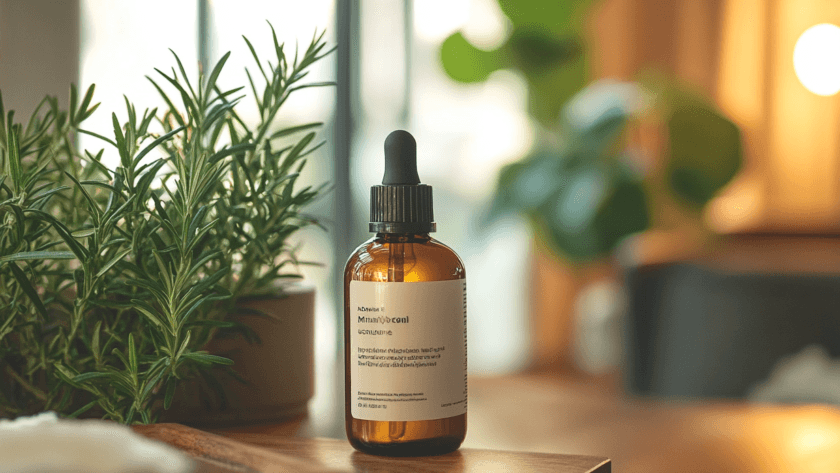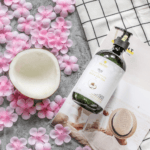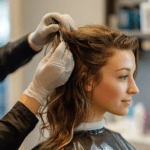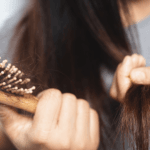Hair loss affects millions of people worldwide, leading many to seek effective treatments to combat thinning hair and promote regrowth. Among the popular options are minoxidil, an FDA-approved pharmaceutical, and rosemary oil, a natural remedy with growing support. But how do these two compare? In this article, we’ll explore their efficacy, mechanisms, and practical considerations to help you make an informed decision.
Contents
Understanding Hair Loss
Androgenetic Alopecia The most common cause of hair loss is androgenetic alopecia, or hereditary hair thinning. This condition is triggered by sensitivity to dihydrotestosterone (DHT), a hormone that shortens the growth phase of hair follicles and causes them to shrink over time. This leads to thinner, shorter hair and eventually, hair loss. Men often experience receding hairlines and bald patches, while women may notice thinning at the crown.
Other Causes Hair loss can also result from stress, nutritional deficiencies, hormonal imbalances, and scalp conditions. Identifying the root cause is crucial to selecting the right treatment.
How Does Rosemary Oil Work?
Mechanism of Action Rosemary oil is believed to promote hair growth through several mechanisms:
- Improved Circulation: It increases blood flow to the scalp, delivering more nutrients and oxygen to hair follicles.
- DHT Reduction: Limited studies suggest rosemary oil may inhibit 5-alpha reductase, an enzyme that converts testosterone into DHT.
- Anti-Inflammatory Properties: Rosemary oil’s antioxidants, such as carnosic acid, reduce scalp inflammation and protect hair follicles from damage.
Clinical Evidence A 2015 study compared rosemary oil with 2% minoxidil in 100 participants with androgenetic alopecia. After six months, both groups showed significant increases in hair count, with no major differences between them. Interestingly, the rosemary oil group reported less scalp itching compared to those using minoxidil.
Another study found that massaging essential oils, including rosemary, into the scalp led to more hair growth than a placebo oil. However, the sample size was small, and further research is needed.
Potential Side Effects
- Skin Irritation: Rosemary oil can cause redness, itching, or rash in sensitive individuals.
- Sun Sensitivity: It may increase the risk of sunburn.
- Allergic Reactions: Patch testing is recommended before use.
How Does Minoxidil Work?
Mechanism of Action Minoxidil is a vasodilator that increases blood flow to the scalp, stimulating hair follicles to enter the growth phase. It also prolongs this phase, allowing hair to grow thicker and longer.
Clinical Evidence Numerous studies have validated minoxidil’s efficacy:
- Hair Count Increases: A 5% minoxidil solution led to a 45% greater increase in hair regrowth compared to a 2% solution.
- User Satisfaction: Two-thirds of women with mild-to-moderate hair loss reported noticeable improvement after eight months.
- Long-Term Results: Hair regrowth peaks after one year of consistent use, but maintenance is required to sustain results.
Potential Side Effects
- Scalp Irritation: Common complaints include itching and flaking.
- Unwanted Hair Growth: Minoxidil can cause hair growth in unintended areas if it drips onto other parts of the body.
- Temporary Shedding: Some users experience increased hair shedding initially as new hair cycles begin.
Comparing Rosemary Oil and Minoxidil
| Feature | Rosemary Oil | Minoxidil |
|---|---|---|
| Efficacy | Promising but less clinically validated | Backed by extensive clinical trials |
| Mechanism | Natural vasodilator, potential DHT blocker | Vasodilator, stimulates hair growth phase |
| Side Effects | Mild irritation, less scalp itching | Scalp irritation, potential unwanted hair growth |
| Application | Massage into scalp, often diluted with a carrier oil | Apply directly to scalp, twice daily |
| Cost | Generally affordable | Varies, but often more expensive than rosemary oil |
| Ease of Use | May require more effort (dilution, massage) | Easy to apply, available in foam or liquid form |
Can You Combine Rosemary Oil and Minoxidil?
For those seeking maximum benefits, combining rosemary oil with minoxidil might be an option. Rosemary oil’s anti-inflammatory properties could help soothe irritation caused by minoxidil, while its potential DHT-blocking effects may complement minoxidil’s action. However, consult a dermatologist before combining treatments to avoid adverse interactions.
Choosing the Right Treatment
Consider Rosemary Oil If:
- You prefer natural remedies.
- You have mild hair loss and want a gentle, cost-effective solution.
- Scalp sensitivity to synthetic products is a concern.
Consider Minoxidil If:
- You seek a proven, FDA-approved treatment.
- Your hair loss is moderate to severe.
- You are willing to commit to long-term use.
Trial and Observation Hair growth treatments take time. It’s essential to be patient and track progress over at least six months. If results are unsatisfactory, consult a dermatologist for further evaluation and alternative treatments.
Final Thoughts
Both rosemary oil and minoxidil offer viable options for addressing hair loss, each with its strengths and limitations. Rosemary oil is a natural, well-tolerated remedy with promising potential, while minoxidil remains the gold standard for efficacy and clinical backing. Understanding your needs, preferences, and the cause of your hair loss will guide you to the most suitable solution.



